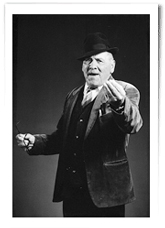Amato Crolla
A life story by Tony Crolla
 The Crolla family have been in Scotland since the late 19th century. The first Crollas arrived in 1880s-1890s, having walked their way to Scotland from Picinisco.
The Crolla family have been in Scotland since the late 19th century. The first Crollas arrived in 1880s-1890s, having walked their way to Scotland from Picinisco.
The main icon of the Crolla family in Scotland is Valvona and Crolla, which probably explains why there are so many Crollas in Scotland, following the boom in Italian foods after the second world war.
Victor Crolla was an entrepeneur of his times. Old Vittorio Crolla, who sadly passed away a few years ago, was my father’s uncle. There were no supermarkets in the 1960s. To get a bottle of olive oil or a kilo of spaghetti in places like Dundee, Broughty Ferry, Stonehaven or Aberdeen was like smuggling drugs.
So Victor had his nephews come up to Scotland. His business was suddenly doing well and expanding, and he was short-staffed. His nephews were still mostly shepherds working on hillside farms back in Italy. They would come over in search of a better life, got married and settled. It is a story in many ways similar to that of the Polish community more recently.
My father was one of the young people to come over. He moved to Edinburgh in 1967. At Valvona and Crolla’s he was working with thirteen first cousins in those years. I don’t know whether they were good for business, but they must have helped out old Vittorio well enough.
Back in Picinisco, Amato, my grandfather, was getting involved in local government. He had been in the army and had been a prisoner of war in Pretoria, in South Africa. He had then been shipped back to Liverpool. This is where his love for the UK started. While a prisoner of war in Liverpool, he had been made part of the military police keeping an eye on the Italian prisoners. The situation was so open that he would be invited to the Women’s Institute to show how to cook his famous pasta and polpette. His sugo, in particular, was very popular with the Liverpudlian women.
He finally went back to Italy, got married and became involved with the Christian Democrats. He still had his farm, but his political passion was steadily growing. He wanted to change things for the better in our area and to channel funding from Rome to improve the lot of people in Picinisco. He was the first one locally to have the telephone in his house. I remember that when my cousins and other Italians from Edinburgh were on holiday in Picinisco, they would come to my grandfather’s house to make phone calls back to the UK.
He was always the first. He had to improve things. He made sure there was street lighting in the village. It was him who had the first road to our village built. Our village, Fontitune, the place where the Crollas come from, was still but a hamlet in the hills above Picinisco, just ten chilometres from Cassino, where the famous battle of Montecassino was fought in the second world war. I remember very well that before the road was built we had to leave the car at the foot of the hill and walk up the whole way.
My grandfather has never been an immigrant or in business in the UK. My mother, his daughter, was only seventeen when she came to Scotland with my father. She didn’t like it too much up here. So my grandfather would come up to visit at the drop of a phone call or following a letter from her. He would be with us for up to three months, sometimes even six months of the year. He was particularly fond of me.
Fastforwarding to myself and to my success in business in Edinburgh – a lot of it is down to my personality, my optimism and my spirit. Many people say to me that this comes directly from nonno Amato. Tony, you are just like him – this is what they say. Very sadly, he is now in the final stages of his life. His health is extremely poor. But his spirit is intact.
So when this proposition came up and I started thinking about sponsoring the Edinburgh Gadda Prize, of course I had business and public relations in mind, I am not going to move from that fact. But I also realised that I would love this prize to take my grandfather's name. One day, I am afraid soon, he will no longer be with us. Through this Prize, people will want to know who this person was and why a prize was named after him.
And here is why. He was a real fighter. He made the impossible possible. He helped people achieve, and gave them the ambition to move on, to go for more. He wouldn’t just talk. His pledges were very real commitments.
I have still got my other granfather, nonno Antonio, who is ninety-nine now. I am called after him. But it was my mother’s father, nonno Amato, who inspired me. In him I can see who and above all what I have taken after. To fight for what you believe. To have the determination to achieve – for yourself and for the people around you. Nonno Amato’s example has been a strong one for me and for the many people who have known him personally. Through this Prize he will now continue to inspire, reaching out in a different way, to people who never had the privilege of being close to him.
« egp home



